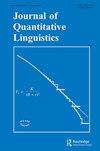基于语料库的名词在语域和学科中的分布研究
IF 1.7
2区 文学
0 LANGUAGE & LINGUISTICS
引用次数: 0
摘要
名词修饰是书面语域中名词修饰的重要来源,尤其是在学术写作中。本研究通过计算T值和对形容词亚型进行Welch T检验,比较了两个语域(小说和学术写作)中形容词和名词形容词的频率。研究发现,在这两个语域中都存在对名词性附加名词的偏好,而且随着语域从小说转向学术写作,形容词附加名词、修饰前名词和修饰后名词的平均频率都在增加。我们通过进行Welch方差分析测试,进一步调查了三个学科组的研究文章摘要中附加名词的频率。不同学科的研究文章摘要中的T值没有显著差异。形容词-附加名词、作为后修饰语的名词和同位名词的差异缺乏实际应用,而学科对名词前修饰频率的影响是不容忽视的。正是预修饰名词的平均频率显示了跨学科研究文章摘要的显著差异。修饰前名词在硬科学文本中比在软科学文本中更普遍。本文章由计算机程序翻译,如有差异,请以英文原文为准。
A Corpus-Based Study of the Distributions of Adnominals Across Registers and Disciplines
ABSTRACT Adnominals are an important resource of noun modification in written registers, especially in academic writing. This study compares the frequencies of adjectival adnominals and nominal adnominals across two registers (Fiction and Academic writing) by calculating T-values and conducting Welch’s t-tests on the adnominal subtypes. It is found that the preference for nominal adnominals exists in both the two registers and the mean frequencies of adjectival adnominals, premodifying nouns and postmodifying nouns increase as the register moves from Fiction to Academic writing. We further investigate the frequencies of adnominals in the research article abstracts across three disciplinary groups by conducting Welch’s ANOVA test. No significant difference is revealed in T-values in the research article abstracts across disciplines. The difference of adjectival adnominals, nouns as postmodifiers and appositive nouns lacks practical applications, while the effects of disciplines on the frequency of premodifying nouns cannot be rejected. It is the mean frequencies of premodifying nouns that show the significant difference in the research article abstracts across disciplines. Premodifying nouns are more prevalent in hard science texts than in soft science texts.
求助全文
通过发布文献求助,成功后即可免费获取论文全文。
去求助
来源期刊

Journal of Quantitative Linguistics
Multiple-
CiteScore
2.90
自引率
7.10%
发文量
7
期刊介绍:
The Journal of Quantitative Linguistics is an international forum for the publication and discussion of research on the quantitative characteristics of language and text in an exact mathematical form. This approach, which is of growing interest, opens up important and exciting theoretical perspectives, as well as solutions for a wide range of practical problems such as machine learning or statistical parsing, by introducing into linguistics the methods and models of advanced scientific disciplines such as the natural sciences, economics, and psychology.
 求助内容:
求助内容: 应助结果提醒方式:
应助结果提醒方式:


